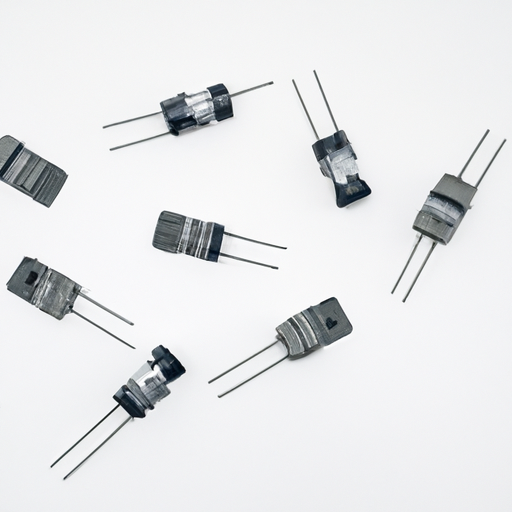What are the Popular DC Resistor Product Models?
I. Introduction
A. Definition of DC Resistors
Direct Current (DC) resistors are passive electronic components that resist the flow of electric current in a circuit. They are fundamental to electronic design, serving various purposes such as limiting current, dividing voltages, and providing biasing for active components.
B. Importance of Resistors in Electronic Circuits
Resistors play a crucial role in electronic circuits. They help control the flow of electricity, protect sensitive components from excessive current, and ensure that circuits operate within their specified parameters. Without resistors, many electronic devices would malfunction or be damaged due to uncontrolled current flow.
C. Overview of the Article's Purpose
This article aims to provide an overview of popular DC resistor product models, exploring their types, specifications, applications, and key considerations for selection. By the end, readers will have a better understanding of the various resistor models available and their significance in electronic design.
II. Understanding Resistor Types
A. Fixed Resistors
Fixed resistors have a constant resistance value and are the most commonly used type in electronic circuits. They come in various materials and constructions, each with unique characteristics.
1. Carbon Composition Resistors
These resistors are made from a mixture of carbon and a binding material. They are known for their high energy absorption capability and are often used in applications where high pulse loads are expected. However, they have a higher tolerance and temperature coefficient compared to other types.
2. Metal Film Resistors
Metal film resistors are made by depositing a thin layer of metal onto a ceramic substrate. They offer better stability, lower noise, and tighter tolerances than carbon composition resistors, making them suitable for precision applications.
3. Wirewound Resistors
Wirewound resistors are constructed by winding a metal wire around a ceramic or fiberglass core. They can handle high power ratings and are often used in applications requiring high precision and stability.
B. Variable Resistors
Variable resistors allow for adjustable resistance values, making them versatile components in electronic circuits.
1. Potentiometers
Potentiometers are used to adjust voltage levels in a circuit. They consist of a resistive element and a movable contact, allowing users to change the resistance by turning a knob or sliding a lever.
2. Rheostats
Rheostats are similar to potentiometers but are typically used to control current rather than voltage. They are often found in applications such as dimmer switches and motor speed controls.
C. Specialty Resistors
Specialty resistors are designed for specific applications and often have unique characteristics.
1. Current Sensing Resistors
These resistors are used to measure current flow in a circuit. They have low resistance values and are designed to handle high currents while providing accurate measurements.
2. High-Voltage Resistors
High-voltage resistors are designed to operate in circuits with high voltage levels. They are constructed to withstand high electrical stress and are often used in power supply applications.
III. Key Specifications of DC Resistors
When selecting a DC resistor, several key specifications must be considered:
A. Resistance Value
The resistance value, measured in ohms (Ω), determines how much current will flow through the resistor for a given voltage. It is essential to choose the correct resistance value to ensure proper circuit operation.
B. Power Rating
The power rating indicates the maximum power the resistor can dissipate without overheating. It is crucial to select a resistor with an appropriate power rating to prevent damage.
C. Tolerance
Tolerance refers to the allowable variation in resistance value. A lower tolerance indicates a more precise resistor, which is essential in applications requiring accuracy.
D. Temperature Coefficient
The temperature coefficient indicates how much the resistance value changes with temperature. Resistors with a low temperature coefficient are preferred in precision applications to maintain stability across varying temperatures.
E. Voltage Rating
The voltage rating specifies the maximum voltage the resistor can handle. Exceeding this rating can lead to resistor failure, so it is vital to choose a resistor with an adequate voltage rating for the application.
IV. Popular DC Resistor Product Models
A. Vishay Dale Resistors
1. Overview of Vishay Dale
Vishay Dale is a well-known manufacturer of resistors, offering a wide range of products for various applications. Their resistors are recognized for their reliability and performance.
2. Popular Models
WSL Series: These are low-resistance, high-power resistors designed for current sensing applications. They offer excellent thermal stability and low inductance.
WSH Series: These resistors are suitable for high-temperature applications and provide high power ratings with low noise.
WSR Series: Known for their precision and stability, these resistors are ideal for applications requiring tight tolerances.
B. Yageo Resistors
1. Overview of Yageo
Yageo is a global leader in passive components, including resistors. They are known for their innovative designs and high-quality products.
2. Popular Models
MFR Series: Metal film resistors that offer high precision and low noise, suitable for a wide range of applications.
CFR Series: Carbon film resistors that provide good stability and are cost-effective for general-purpose applications.
C. Panasonic Resistors
1. Overview of Panasonic
Panasonic is a renowned electronics manufacturer that produces a variety of components, including resistors known for their quality and reliability.
2. Popular Models
ERJ Series: These are thin-film resistors that offer high precision and stability, making them ideal for automotive and industrial applications.
D. Bourns Resistors
1. Overview of Bourns
Bourns is a leading manufacturer of electronic components, including a wide range of resistors known for their durability and performance.
2. Popular Models
3296 Series: These are trimmer potentiometers that allow for fine adjustments in resistance, making them suitable for calibration and tuning applications.
E. Ohmite Resistors
1. Overview of Ohmite
Ohmite is a manufacturer specializing in high-power resistors and is known for its robust and reliable products.
2. Popular Models
50W Series: These wirewound resistors are designed for high power applications and offer excellent thermal performance.
100W Series: Similar to the 50W series but with higher power ratings, suitable for demanding applications.
V. Applications of DC Resistors
DC resistors are used in a variety of applications across different industries:
A. Consumer Electronics
In consumer electronics, resistors are used in devices such as televisions, radios, and smartphones to control current and voltage levels.
B. Automotive Applications
Resistors play a critical role in automotive electronics, including in sensors, control units, and lighting systems.
C. Industrial Equipment
In industrial settings, resistors are used in machinery and control systems to ensure proper operation and safety.
D. Telecommunications
Telecommunication devices rely on resistors for signal processing and conditioning, ensuring clear and reliable communication.
E. Medical Devices
In medical devices, precision resistors are essential for accurate measurements and reliable operation, contributing to patient safety and effective treatment.
VI. Factors to Consider When Choosing a DC Resistor
When selecting a DC resistor, several factors should be considered:
A. Application Requirements
Understanding the specific requirements of the application is crucial for selecting the right resistor. This includes resistance value, power rating, and tolerance.
B. Environmental Conditions
Consider the environmental conditions in which the resistor will operate, including temperature, humidity, and exposure to chemicals.
C. Cost Considerations
While quality is essential, cost is also a factor. It is important to find a balance between performance and budget.
D. Availability and Supply Chain
Ensure that the chosen resistor model is readily available and that the supply chain is reliable to avoid delays in production.
VII. Conclusion
A. Recap of Popular DC Resistor Models
In this article, we explored various popular DC resistor models from reputable manufacturers such as Vishay Dale, Yageo, Panasonic, Bourns, and Ohmite. Each of these manufacturers offers a range of resistors suitable for different applications.
B. Importance of Selecting the Right Resistor
Choosing the right resistor is critical for the performance and reliability of electronic circuits. Understanding the specifications and applications of different resistor types can help engineers and designers make informed decisions.
C. Future Trends in Resistor Technology
As technology advances, we can expect to see innovations in resistor design, including improved materials, enhanced precision, and greater power handling capabilities. These advancements will continue to support the evolving needs of electronic applications.
VIII. References
A. List of Sources for Further Reading
- Manufacturer websites and product catalogs
- Electronics textbooks and reference materials
- Industry publications and journals
B. Manufacturer Websites and Product Catalogs
- Vishay Dale: [www.vishay.com](http://www.vishay.com)
- Yageo: [www.yageo.com](http://www.yageo.com)
- Panasonic: [www.panasonic.com](http://www.panasonic.com)
- Bourns: [www.bourns.com](http://www.bourns.com)
- Ohmite: [www.ohmite.com](http://www.ohmite.com)
By understanding the various types of DC resistors and their applications, engineers and hobbyists alike can make informed choices that enhance the performance and reliability of their electronic designs.
What are the Popular DC Resistor Product Models?
I. Introduction
A. Definition of DC Resistors
Direct Current (DC) resistors are passive electronic components that resist the flow of electric current in a circuit. They are fundamental to electronic design, serving various purposes such as limiting current, dividing voltages, and providing biasing for active components.
B. Importance of Resistors in Electronic Circuits
Resistors play a crucial role in electronic circuits. They help control the flow of electricity, protect sensitive components from excessive current, and ensure that circuits operate within their specified parameters. Without resistors, many electronic devices would malfunction or be damaged due to uncontrolled current flow.
C. Overview of the Article's Purpose
This article aims to provide an overview of popular DC resistor product models, exploring their types, specifications, applications, and key considerations for selection. By the end, readers will have a better understanding of the various resistor models available and their significance in electronic design.
II. Understanding Resistor Types
A. Fixed Resistors
Fixed resistors have a constant resistance value and are the most commonly used type in electronic circuits. They come in various materials and constructions, each with unique characteristics.
1. Carbon Composition Resistors
These resistors are made from a mixture of carbon and a binding material. They are known for their high energy absorption capability and are often used in applications where high pulse loads are expected. However, they have a higher tolerance and temperature coefficient compared to other types.
2. Metal Film Resistors
Metal film resistors are made by depositing a thin layer of metal onto a ceramic substrate. They offer better stability, lower noise, and tighter tolerances than carbon composition resistors, making them suitable for precision applications.
3. Wirewound Resistors
Wirewound resistors are constructed by winding a metal wire around a ceramic or fiberglass core. They can handle high power ratings and are often used in applications requiring high precision and stability.
B. Variable Resistors
Variable resistors allow for adjustable resistance values, making them versatile components in electronic circuits.
1. Potentiometers
Potentiometers are used to adjust voltage levels in a circuit. They consist of a resistive element and a movable contact, allowing users to change the resistance by turning a knob or sliding a lever.
2. Rheostats
Rheostats are similar to potentiometers but are typically used to control current rather than voltage. They are often found in applications such as dimmer switches and motor speed controls.
C. Specialty Resistors
Specialty resistors are designed for specific applications and often have unique characteristics.
1. Current Sensing Resistors
These resistors are used to measure current flow in a circuit. They have low resistance values and are designed to handle high currents while providing accurate measurements.
2. High-Voltage Resistors
High-voltage resistors are designed to operate in circuits with high voltage levels. They are constructed to withstand high electrical stress and are often used in power supply applications.
III. Key Specifications of DC Resistors
When selecting a DC resistor, several key specifications must be considered:
A. Resistance Value
The resistance value, measured in ohms (Ω), determines how much current will flow through the resistor for a given voltage. It is essential to choose the correct resistance value to ensure proper circuit operation.
B. Power Rating
The power rating indicates the maximum power the resistor can dissipate without overheating. It is crucial to select a resistor with an appropriate power rating to prevent damage.
C. Tolerance
Tolerance refers to the allowable variation in resistance value. A lower tolerance indicates a more precise resistor, which is essential in applications requiring accuracy.
D. Temperature Coefficient
The temperature coefficient indicates how much the resistance value changes with temperature. Resistors with a low temperature coefficient are preferred in precision applications to maintain stability across varying temperatures.
E. Voltage Rating
The voltage rating specifies the maximum voltage the resistor can handle. Exceeding this rating can lead to resistor failure, so it is vital to choose a resistor with an adequate voltage rating for the application.
IV. Popular DC Resistor Product Models
A. Vishay Dale Resistors
1. Overview of Vishay Dale
Vishay Dale is a well-known manufacturer of resistors, offering a wide range of products for various applications. Their resistors are recognized for their reliability and performance.
2. Popular Models
WSL Series: These are low-resistance, high-power resistors designed for current sensing applications. They offer excellent thermal stability and low inductance.
WSH Series: These resistors are suitable for high-temperature applications and provide high power ratings with low noise.
WSR Series: Known for their precision and stability, these resistors are ideal for applications requiring tight tolerances.
B. Yageo Resistors
1. Overview of Yageo
Yageo is a global leader in passive components, including resistors. They are known for their innovative designs and high-quality products.
2. Popular Models
MFR Series: Metal film resistors that offer high precision and low noise, suitable for a wide range of applications.
CFR Series: Carbon film resistors that provide good stability and are cost-effective for general-purpose applications.
C. Panasonic Resistors
1. Overview of Panasonic
Panasonic is a renowned electronics manufacturer that produces a variety of components, including resistors known for their quality and reliability.
2. Popular Models
ERJ Series: These are thin-film resistors that offer high precision and stability, making them ideal for automotive and industrial applications.
D. Bourns Resistors
1. Overview of Bourns
Bourns is a leading manufacturer of electronic components, including a wide range of resistors known for their durability and performance.
2. Popular Models
3296 Series: These are trimmer potentiometers that allow for fine adjustments in resistance, making them suitable for calibration and tuning applications.
E. Ohmite Resistors
1. Overview of Ohmite
Ohmite is a manufacturer specializing in high-power resistors and is known for its robust and reliable products.
2. Popular Models
50W Series: These wirewound resistors are designed for high power applications and offer excellent thermal performance.
100W Series: Similar to the 50W series but with higher power ratings, suitable for demanding applications.
V. Applications of DC Resistors
DC resistors are used in a variety of applications across different industries:
A. Consumer Electronics
In consumer electronics, resistors are used in devices such as televisions, radios, and smartphones to control current and voltage levels.
B. Automotive Applications
Resistors play a critical role in automotive electronics, including in sensors, control units, and lighting systems.
C. Industrial Equipment
In industrial settings, resistors are used in machinery and control systems to ensure proper operation and safety.
D. Telecommunications
Telecommunication devices rely on resistors for signal processing and conditioning, ensuring clear and reliable communication.
E. Medical Devices
In medical devices, precision resistors are essential for accurate measurements and reliable operation, contributing to patient safety and effective treatment.
VI. Factors to Consider When Choosing a DC Resistor
When selecting a DC resistor, several factors should be considered:
A. Application Requirements
Understanding the specific requirements of the application is crucial for selecting the right resistor. This includes resistance value, power rating, and tolerance.
B. Environmental Conditions
Consider the environmental conditions in which the resistor will operate, including temperature, humidity, and exposure to chemicals.
C. Cost Considerations
While quality is essential, cost is also a factor. It is important to find a balance between performance and budget.
D. Availability and Supply Chain
Ensure that the chosen resistor model is readily available and that the supply chain is reliable to avoid delays in production.
VII. Conclusion
A. Recap of Popular DC Resistor Models
In this article, we explored various popular DC resistor models from reputable manufacturers such as Vishay Dale, Yageo, Panasonic, Bourns, and Ohmite. Each of these manufacturers offers a range of resistors suitable for different applications.
B. Importance of Selecting the Right Resistor
Choosing the right resistor is critical for the performance and reliability of electronic circuits. Understanding the specifications and applications of different resistor types can help engineers and designers make informed decisions.
C. Future Trends in Resistor Technology
As technology advances, we can expect to see innovations in resistor design, including improved materials, enhanced precision, and greater power handling capabilities. These advancements will continue to support the evolving needs of electronic applications.
VIII. References
A. List of Sources for Further Reading
- Manufacturer websites and product catalogs
- Electronics textbooks and reference materials
- Industry publications and journals
B. Manufacturer Websites and Product Catalogs
- Vishay Dale: [www.vishay.com](http://www.vishay.com)
- Yageo: [www.yageo.com](http://www.yageo.com)
- Panasonic: [www.panasonic.com](http://www.panasonic.com)
- Bourns: [www.bourns.com](http://www.bourns.com)
- Ohmite: [www.ohmite.com](http://www.ohmite.com)
By understanding the various types of DC resistors and their applications, engineers and hobbyists alike can make informed choices that enhance the performance and reliability of their electronic designs.













